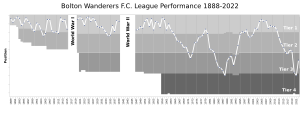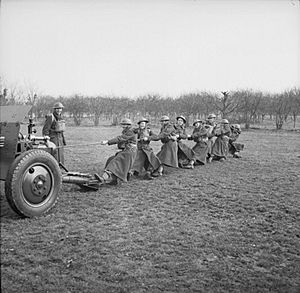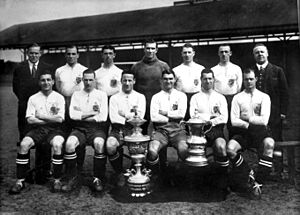History of Bolton Wanderers F.C. facts for kids
The history of Bolton Wanderers Football Club tells the story of a famous English football team from when it started in 1874 until today. If you want to learn more about the club itself, check out Bolton Wanderers F.C..
Contents
How Bolton Wanderers Started (1874-1929)

Bolton Wanderers was first created in June 1874 by a school teacher named Reverend Thomas Ogden. It was called "Christ Church F.C." back then. The club started near Christ Church in Bolton.
In 1877, the club had a disagreement with the church and moved away. They changed their name to "Bolton Wanderers." They chose this name because they often had trouble finding a permanent home ground. In their first four years, they played at three different places!
Bolton was one of the 12 original teams that formed the Football League in 1888. This was a very important moment for English football. Bolton has played more seasons in the top league than any other club without winning the league title.
The team reached the final of the FA Cup for the first time in 1894. However, they lost 4–1 to Notts County. Ten years later, in 1904, they were runners-up again. They lost 1–0 to their local rivals Manchester City.
The years around the First World War were very good for Bolton. They often finished high up in the top league. Between 1911 and 1928, they were usually in the top 8 teams. They even finished third twice, in 1921 and 1925. In 1925, they almost won the league, missing out by just 3 points!
On April 28, 1923, Bolton won their first major trophy. They beat West Ham United 2–0 in the first ever FA Cup final played at the original Wembley Stadium. This match is famous as "The White Horse Final" because a police officer on a white horse helped control the huge crowd. Over 127,000 fans were there! Bolton's player, David Jack, scored the very first goal at Wembley Stadium.
Bolton became the most successful team in the FA Cup during the 1920s. They won it again in 1926 and 1929. They beat Manchester City and Portsmouth in those finals.
A Golden Era and a Sad Day (1929-1958)

From 1935 to 1964, Bolton stayed in the top football league without interruption. Fans remember this as a "golden era." A famous player named Nat Lofthouse led the team in the 1950s.
During World War II, many Bolton players joined the army. This was unusual for top football teams. At least 15 Bolton professional players, led by their captain Harry Goslin, volunteered in 1939. They joined the 53rd Bolton Artillery regiment. By the end of the war, 32 out of 35 pre-war players had served in the British forces. Sadly, Harry Goslin was killed in Italy in 1943.
On March 9, 1946, a terrible event happened at Bolton's home ground, Burnden Park. This was the Burnden Park disaster, the worst tragedy in British football at the time. Thirty-three Bolton fans died, and 400 more were hurt. This happened during an FA Cup match against Stoke City. About 85,000 people were crammed into the stadium, which was 15,000 over its safe capacity. This disaster led to new rules for controlling crowd sizes at football games.
In 1953, Bolton played in another famous FA Cup final, known as "The Stanley Matthews Final." Bolton lost 4–3 to Blackpool, even after being 3–1 ahead. Blackpool won thanks to the amazing skills of Stanley Matthews.
Bolton has not won a major trophy since 1958. In that year, two goals from Nat Lofthouse helped them beat Manchester United in the FA Cup final at Wembley Stadium. The closest they have come since then is being runners-up in the League Cup in 1995 and again in 2004.
Ups and Downs (1958-1995)
In May 1978, Bolton won the Second Division title and moved up to the First Division. However, they only stayed there for two seasons before being relegated again.
After being relegated in 1980, Bolton signed Brian Kidd, a famous striker. But the team struggled, and the manager was sacked. In 1983, Bolton was relegated again, this time to the Third Division.
The club then faced a tough period. In 1987, Bolton was relegated to the Fourth Division for the first time ever. But they quickly bounced back! Under manager Phil Neal, they won promotion back to the Third Division the very next season. A goal by Robbie Savage secured their promotion in a thrilling 1–0 win. During this time, Nat Lofthouse became the club's lifetime President.
In the early 1990s, under manager Bruce Rioch, Bolton became known as "giant-killers" in cup competitions. In 1993, they beat FA Cup holders Liverpool 2–0. They also defeated other higher-division teams. That year, Bolton also moved up to the second tier of English football for the first time since 1983. In 1994, they beat FA Cup holders Arsenal 3–1 and reached the quarter-finals.
The Colin Todd and Sam Allardyce Years (1995-2007)
In 1995, Bolton reached the Premiership under manager Bruce Rioch. They won a playoff final against Reading. Rioch then left for Arsenal, and Colin Todd became the manager. Bolton struggled in the Premiership and were relegated in 1996.
However, the club kept faith in Todd, and he led them straight back to the Premiership! In the 1996-97 season, they won the Division One championship with 98 points and 100 goals. This season also marked a big change: the club moved from their old home, Burnden Park, to the new Reebok Stadium. John McGinlay scored the last goal at Burnden Park.
Bolton was relegated from the Premiership again in 1998. Colin Todd resigned the following year, and Sam Allardyce took over as manager.
Under Sam Allardyce, Bolton returned to the Premier League in 2001 after winning the play-off final. They had some tough seasons but managed to stay in the Premier League. They signed experienced international players like Youri Djorkaeff and Jay-Jay Okocha, who became a legend at the club.
In 2004, Bolton reached the League Cup final but lost to Middlesbrough. Still, they finished eighth in the league, which was their highest Premiership finish at the time. In 2005, they finished sixth, which meant they qualified for the UEFA Cup (a European competition) for the first time ever! They reached the last 32 in the UEFA Cup the next season.
In April 2007, Sam Allardyce resigned. In his last four seasons, he had led Bolton to consistent top-ten finishes.
Later Years and Challenges (2007-Present)
After Allardyce left, Sammy Lee and then Gary Megson managed the team. Megson helped Bolton avoid relegation and took them to the last sixteen of the UEFA Cup. They even had a famous draw against Bayern Munich in Germany!
In 2008, Bolton broke their transfer record by signing Johan Elmander. However, tensions grew between Megson and the fans. He was sacked in December 2009. Former player Owen Coyle became the new manager.
Owen Coyle helped Bolton stay in the top flight for a tenth season. He signed players like Stuart Holden and Jack Wilshere. In the 2010–11 FA Cup, Bolton reached the semi-finals but lost badly to Stoke City.
In 2012, Bolton faced a very difficult time. A player named Fabrice Muamba suffered a cardiac arrest during an FA Cup match. Everyone at the club and across the country rallied to support him.
On May 13, 2012, Bolton was relegated from the Premiership on the very last day of the season. The club faced financial problems and had to cut player wages. In October 2012, Owen Coyle was also sacked.
Since then, managers like Dougie Freedman, Neil Lennon, and Phil Parkinson have led the club. Bolton was relegated to the third tier of English football in 2016 for the first time since 1993. However, under Phil Parkinson, they won promotion back to the second tier the very next season!
Despite this success, the club continued to face severe financial problems. They were relegated back to the third tier at the end of the 2018–19 season. The history of Bolton Wanderers shows a club with many highs and lows, but always with a strong spirit.
|
 | Sharif Bey |
 | Hale Woodruff |
 | Richmond Barthé |
 | Purvis Young |


